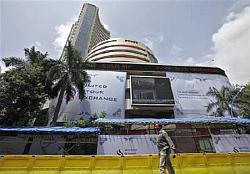 | « Back to article | Print this article |
Market regulator Sebi has decided to extend the pre-open call auction facility to all scrips, which would be available in all stock exchanges. Generally, in a call auction the buyers set a maximum price at which the shares can be bought while the sellers keep a minimum price for selling the scrips.
Generally, in a call auction the buyers set a maximum price at which the shares can be bought while the sellers keep a minimum price for selling the scrips.
Generally, this facility - conducted before start of trading session - helps in reducing price volatility.
Securities and Exchange Board of India (Sebi) has also introduced periodic call auction sessions for illiquid shares in the equity market.
The call auction facility for all scrips, including illiquid ones, would be effective from April 1 this year, Sebi said in a circular on Thursday.
Currently, the pre-open call auction sessions are in place on pilot basis for shares on benchmark Sensex and Nifty indices. The 30-share Sensex is part of the BSE while the 50-share Nifty is the key index of National Stock Exchange.
Besides, it is also available for Initial Public Offering (IPO) as well as re-listed shares.
According to the circular, Sebi has decided to "extend the pre-open session to all other scrips in the equity market" as well as "introduce trading through periodic call auction for illiquid scrips in equity market.”
The decision has been taken following deliberations by Secondary Market Advisory Committee (SMAC).
The pre-open call auction session would be open to scrips in all exchanges.
"... pre-open call auction session shall be applicable to all exchanges with active trading and for all scrips that are not classified as illiquid," Sebi said.
The price bands for such sessions would be applicable in the normal market, the guidelines said.
"All orders shall be checked for margin sufficiency at order level for inclusion in pre-open